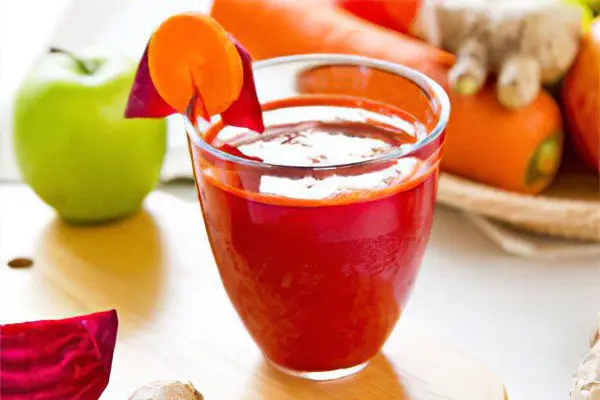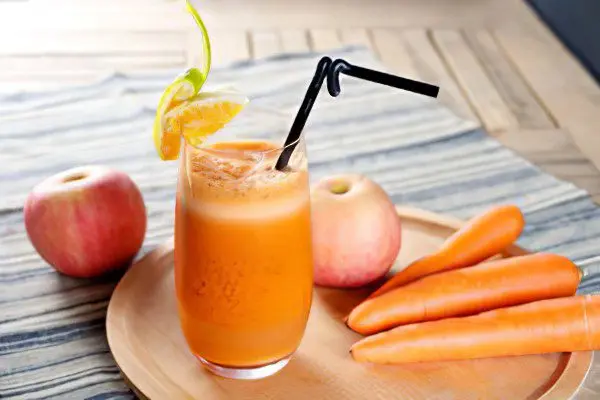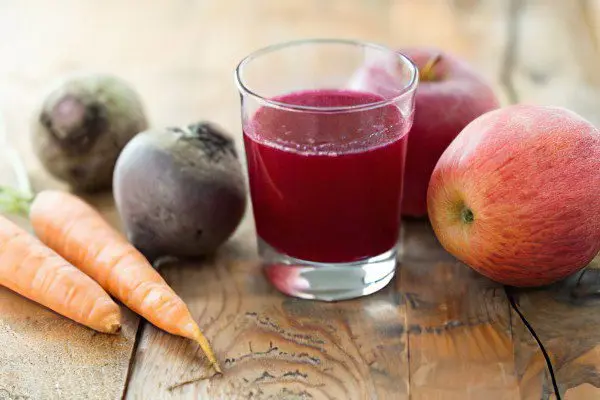Contents
- The composition and calorie content of carrots
- Benefits of freshly squeezed carrot juice
- Harm of carrot juice
- How to drink carrot juice?
- Popular Carrot Juice Blends
- Popular questions and answers
- How much carrot juice can you drink a day?
- How long can freshly squeezed carrot juice be stored?
- How often can you drink carrot juice? Can you drink it every day?
- Is it possible to drink carrot juice during pregnancy?
- From how many months can you give carrot juice?
- How much carrot juice can you give a child?
- The benefits of carrot juice in some diseases
- Contraindications to the use of carrots
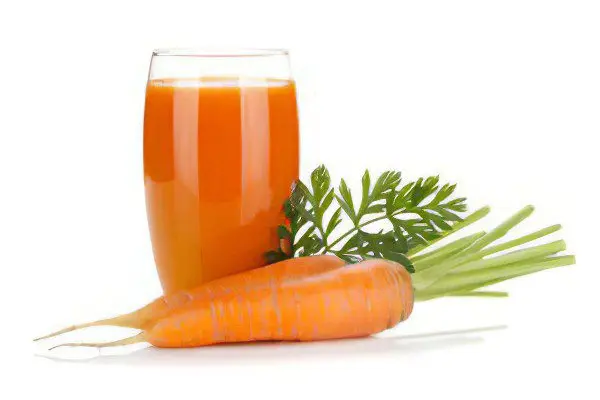
Carrot contains vitamins C, PP, B, K, E. Carotene, which is present in carrots, in the human body instantly turns into vitamin A. Along with this, it should be noted a large amount of minerals – iron, phosphorus, potassium, magnesium, copper, cobalt, zinc, iodine, as well as fluorine and nickel.
Thanks to essential oils, carrots have a subtle but pleasant aroma. The healing properties of the vegetable have been proven in diseases such as myopia and conjunctivitis. Carrots are also used to strengthen the retina.
Carrots are mainly used in human nutrition. Fresh carrots are great for strengthening gums and promoting growth. This vegetable has a beneficial effect on the skin and mucous membranes. Raw carrot puree is indicated for colitis, kidney and liver diseases. Carrot juice is effective for anemia and disorders of the cardiovascular system. In addition, it is a healing agent for cancers and ulcers. Often, boiled carrots are used in the diets of people with diabetes.
The composition and calorie content of carrots
Calories 41 KKal
- Fats:
0,2 g
- Proteins:
1,2 g
- Carbohydrates:
9,6 g
- Water:
88 g
- Ash:
1 g
- Cellulose:
3 g
Vitamins (in 100 g): | Quantity | %RDN |
Beta-carotene | 5650-16300 μg | 224% |
Vitamin A (retinol) | 835 mcg | 104% |
Vitamin B9 (folic acid) | 19-47 μg | 13,8% |
Vitamin K | 10-20,2 μg | 11% |
Minerals (in 100 g): | Quantity | %RDN |
Bor | 200 mcg | 286% |
Vanadium | 99 mcg | 248% |
Silicon | 25 mg | 83% |
* Mercury | 0,6 mcg | 60% |
Molybdenum | 20 mcg | 28,6% |
Rubidium | 23,5 mcg | 23,5% |
Manganese | 140-690 μg | 21,5% |
Cobalt | 2 mcg | 20% |
potassium | 225-380 mg | 13% |
Full chemical composition ➤
Other important connections:
Purine — 6 mg (5% of RDI)
Oxalic acid — 44 mg (11% of RDI)
Benefits of freshly squeezed carrot juice
Freshly squeezed carrot juice is a concentrate of nutrients in a digestible form for the body. This is a complex of vitamins and minerals that prevent the destruction of cells by free radicals and toxins, and are essential components for the synthesis of hormones, pigments, structural elements of the cell.
Carrots are a record-breaking vegetable in terms of the amount of beta-carotene, which is converted into vitamin A in the body, and participates in the formation of bone tissue, is necessary for the normal functioning of the endocrine glands, and prevents vision pathologies, skin and hair diseases. Regular consumption of raw carrots and carrot juice helps to cleanse the body, remove toxins from it, heavy metals that accumulate in industrial cities. In addition, carrots are an excellent tool for cleansing the liver, preventing blockage of its duct and fatty degeneration.
What are the benefits of carrots?

Vitamin E in the composition of carrots provides its anti-carcinogenic effect. In laboratory conditions, studies were carried out: a sample of tumor tissue was placed in blood serum saturated with vitamin E, and it was found that it stops growing. The antioxidant properties of vitamin E help prevent the formation of tumors, cancerous degeneration of cells. A plant-based diet rich in vitamins A, E, and C helps to strengthen the body’s natural anti-cancer defenses and prevents free radical damage to cells and tissues.
Complex of minerals – sodium and potassium, necessary for cellular transport, phosphorus, zinc, copper, necessary for the construction of cellular structures, the synthesis of melanin and skin collagen, iron, which plays an important role in hematopoiesis, and selenium, the deficiency of which negatively affects the immune system of the inhabitants of the metropolis. Nicotinic acid, which is present in the composition of carrots, is necessary in the processes of lipid metabolism, so regular consumption of carrot juice helps prevent atherosclerosis, fatty liver, and high cholesterol.
Calcium, its content in carrots is quite high (in 100 g of the product – 233 mg, that is, 1/5 of the daily norm), and in addition, calcium in carrot juice is better absorbed. Synthetic preparations with calcium are absorbed by a maximum of 5%, and as part of the juice – by 40%. Thus, notes Dr. Walker, the systematic use of carrot juice is more beneficial than taking 12 kg of calcium tablets.
Carotene, contained in carrots, not only maintains visual acuity, but also has a rejuvenating effect on cells, accelerating their regeneration after damage and prolonging their lifespan.
Other Benefits of Carrot Juice:
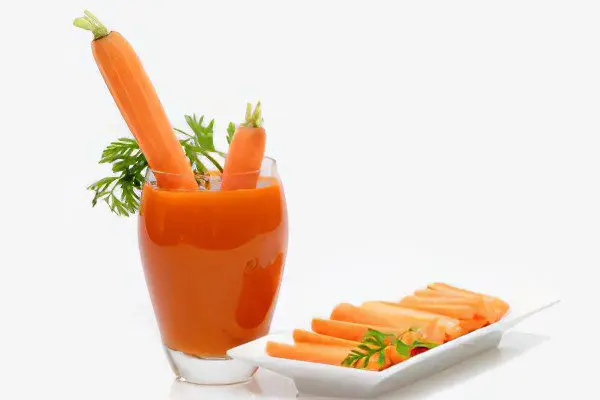
Carrots have a beneficial effect on the state of the digestive system, affecting the secretory glands of the digestive tract. Therefore, it is recommended to drink carrot juice before meals to increase the efficiency of food digestion.
Another useful property of carrot juice is the ability to calm the nervous system, preventing its exhaustion, relieve nervous tension and increase resistance to stress.
Carrot juice as a remedy for exhaustion and intestinal problems was used by the ancient Greeks, the Mediterranean region is considered the birthplace of carrots. At the dawn of civilization, doctors used carrot juice to cleanse the body, as well as to stimulate the intestines with constipation and diarrhea.
Carrot juice is also known for its antiseptic properties – it is used topically to treat ulcers and suppurations, prevent sepsis in newborns, and as a prevention of infection in autumn and winter.
Other studies were carried out on laboratory animals, which were divided into two groups and fed differently. Dietary differences were in the amount of vitamin E that the food contained. The group with a high content of vitamin E in the diet showed a high resistance to oncogenic formations, while in the second group, malignant tumors appeared more often and grew faster. Vitamin E along with carrot phytoestrogens helps in solving the problem of infertility in women.
Carrot juice is traditionally considered the best way to prevent such a pathology of vision as “night blindness” – this is a violation of twilight vision, in which it is difficult for a person to focus when moving from a well-lit room to twilight. This often causes accidents on the road at night and twilight.
Benefits of Carrot Juice for Children
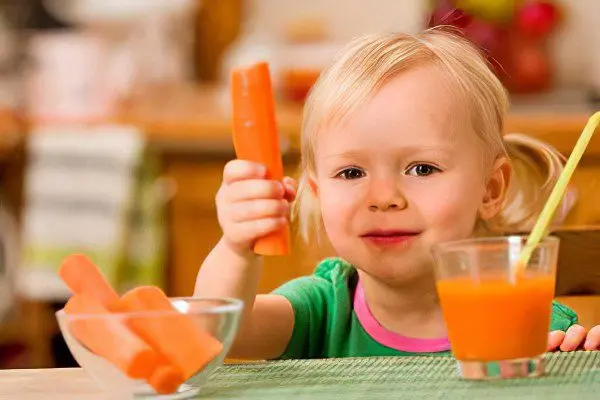
For children, the benefits of carrot juice are as follows:
Carrot juice is included in the list of first foods for babies, it can be given starting from 6 months of a child’s life. Moreover, carrot juice should be drunk by women, both during pregnancy and lactation, to improve the quality of mother’s milk, saturate it with useful trace elements, and increase resistance to infection.
Carrot juice normalizes the condition of the mucous membranes of the body – the mucous membrane of the mouth, nose, eyes and internal organs. This strengthens the body’s barrier forces, since the mucous membranes of the mouth and nose are often the gateway to infection. Therefore, the systematic use of raw carrots and freshly squeezed juice will help the child avoid illness during the epidemic season in kindergarten and school. In some cases, this method of strengthening immunity is better than garlic and onions, which are usually used for this purpose – drinking carrot juice is easy and pleasant, and it does not leave a specific aroma behind. Thus, carrot juice protects against colds, inflammation of the tonsils, otitis , sinusitis, sinusitis. The normalizing effect of vitamin A on the secretion of internal mucous membranes helps prevent infections of the kidneys, bladder and its duct, gastritis and stomach ulcers.
Dental disease is often associated with a lack of calcium (the main source of which is considered milk and dairy products), as well as a lack of vitamin C, which can provoke scurvy and other gum diseases. However, carrot juice is an excellent source of easily digestible calcium, in many cases more useful than milk, as it has a lower calorie content. Also keep in mind that many people are allergic to lactose or have other problems with the metabolism of dairy products, which is why vegetable juices remain almost the only way to compensate for the lack of calcium in a natural way.
Vitamin A, synthesized from beta-carotene, is necessary for the normal formation of bone tissue, participates in the formation of dentin and tooth enamel.
The number of units of vitamin A for adults is 5000 units per day, children need to consume from 1500 to 4000 units daily, while the daily requirement for pregnant and lactating mothers can increase to 8000. Undiluted carrot juice in the volume of one glass covers several times the daily requirement of this vitamin , since it contains 45 thousand of its units. Naturally, it is difficult to take such a quantity of juice for a single intake out of habit, but when diluted with water, apple or other vegetable juices, carrot juice is easy and pleasant to drink. A glass of juice a day will protect you from all the problems caused by a lack of vitamin A, including dull hair, brittle nails, flaky, dry and allergic skin, thinning tooth enamel.
Harm of carrot juice
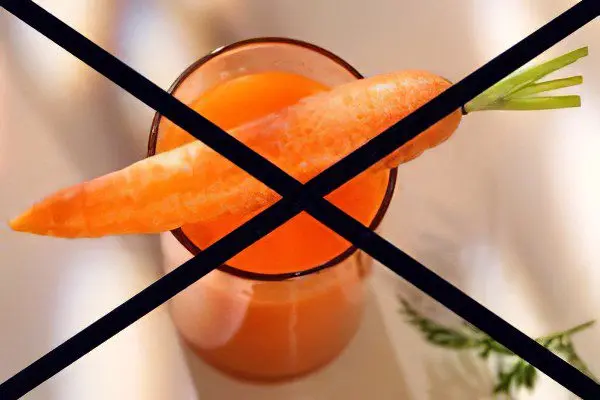
Carrot juice in large quantities can cause a non-standard reaction of the body – lethargy and drowsiness, headache, nausea, or symptoms of food poisoning. As with any product, you need to get used to carrot juice gradually. The norm for an adult is 250 ml per day – this is the amount of juice contained in one glass.
Raw foodists and supporters of juice therapy believe that you can drink up to 3-4 liters of juice per day, but if you do not want to take risks, stop at 500-1000 ml per day.
Another problem that can occur with the systematic use of carrot juice is yellowing of the skin, especially for fingers and toes, and the face. There are two theories for the occurrence of carrot “jaundice”. According to one version, yellowing is caused by the release of toxins through the skin, which the excretory system cannot cope with when the liver is actively cleansed.
Another version explains the yellowish tint of the skin after taking carrot juice with an excess of beta-carotene, which is thus released without having time to be absorbed.
In any case, after some time after stopping juice therapy, the skin returns to normal. If you have been taking juice regularly for several months, the process of returning to normal will take a little longer. Yellowing or blanching of the skin after taking carrot juice in large quantities is not a dangerous phenomenon and goes away on its own.
Harmful carrot juice can be with exacerbations of gastritis and pancreatitis, as well as diabetes. Nevertheless, even with stomach ulcers, intestinal colic and hyperacidity gastritis, this product is recommended to be included in the diet in small quantities, getting used to it gradually so as not to cause a negative reaction.
How to drink carrot juice?
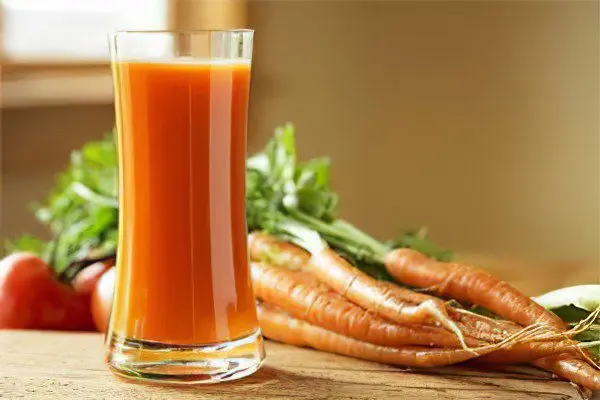
One of the main recommendations when using carrot juice for the treatment of various diseases is its combination with fats – cream, olive oil. This is due to the presence of fat-soluble vitamins in the composition of carrots. However, carrot juice retains its beneficial properties even when drunk in its pure form. The only condition that must be observed during juice therapy is not to add sugar or salt to the juice; to give other shades of taste, carrot juice can be diluted with other juices. Mixtures of vegetable juices can enhance the beneficial effect of each of the components. The most popular juice combinations are carrot+apple, carrot+beetroot+apple, carrot+beetroot, carrot+celery.
You need to drink carrot juice on an empty stomach, after which it is advisable not to eat foods with fast carbohydrates – sweets, pastries, starchy foods. You can not drink juice in one gulp – an increased concentration of biologically active substances, carotene, vitamins, minerals can create an excessive load on the stomach and pancreas, which is manifested by a feeling of discomfort. It is best to drink juice through a straw – firstly, this ensures the gradual intake of the product in small portions, which facilitates digestion, and secondly, one should not forget that the digestive process begins already in the oral cavity, and the suction movements of the straw contribute to the secretion of the salivary glands.
Carrot juice for children is recommended to be diluted with boiled water to reduce its concentration and prevent unwanted reactions of the body. To do this, use boiled, melted water or water from a source. However, it is the water that comes from the juice that is most useful, since it is structured in a natural way and is better absorbed by the cells. It is better to combine carrot juice with apple and other juices.
Popular Carrot Juice Blends
Beet-carrot juice The combination of vegetable juices of beets and carrots has a tonic, immunomodulatory and detoxifying effect on the body. Carrot carotene helps restore the liver, prevent eye diseases, and strengthen the body’s defenses against infection. Beetroot juice promotes hematopoiesis and, in combination with carrot juice, restores the acid-base balance of the body. This juice mixture is useful for pregnant women, whose circulating blood volume increases by a third, respectively, there is a need for structural elements for new blood cells. In addition, the vitamin A found in carrot juice prevents stretch marks by making the skin more elastic and boosting collagen synthesis (which is also helped by the copper content of carrots). Carrot and beetroot juice corrects the condition of women with menstrual disorders, dysmenorrhea, oligohypomenorrhea, painful periods. It is recommended to use it to mitigate the negative manifestations of menopause. The initial dosage is 50-100 ml per day, it can be increased to 0,5 liters of juice daily if there is no discomfort in the stomach and pancreas, nausea or allergic reactions. |
Apple-carrot juice A mixture of carrot and apple juice is one of the most commonly used juice therapy recipes. The combination of carrot juice with apple juice is recommended for those who are not used to drinking concentrated carrot juice, this combination not only has a rich and pleasant taste, but is also more efficiently absorbed. It can be used by both young children and adults during the course of cleansing procedures. For comparison: a healthy person who is just starting to take carrot juice is recommended not to exceed the dosage of 250 ml / day, while apple juice can easily be drunk up to a liter per day. Therefore, the proportion of the mixture may be different, depending on the degree of preparedness of the patient. Apple juice has unique properties that are beneficial for the nervous system – it not only protects neurons from radical damage, but can also prevent the development of Alzheimer’s disease. Carrot-apple juice is used for the treatment and prevention of congestion of the liver and gallbladder, cleansing of stones, blockage of the biliary tract. Such a mixture can even be used in a diet for diabetics, only green apples of sour varieties with a lower sugar content are used for juice. Antioxidant vitamins in apple juice – C and E, it also contains vitamins B1, B2, PP and minerals – calcium, iodine, manganese, zinc, magnesium, fluorine, copper, iron and others. |
Carrot-beetroot-apple juice The juice of carrots, beets and apples in combination can work wonders with the human body. According to one study, after three months of juice therapy with this mixture, significant improvements were found in the condition of patients with lung cancer, slowing the growth of the tumor and the transition of the disease to the stage of remission. A glass of apple, carrot and beet juice blend provides the body with vitamins and nutrients for the whole day, restoring its mineral balance. This combination is used to cleanse the body, remove toxins, and relieve arthritic pain. The systematic use of carrot-beetroot-apple juice helps to avoid the formation of gallstones and contributes to the prevention of cancer. |
Popular questions and answers
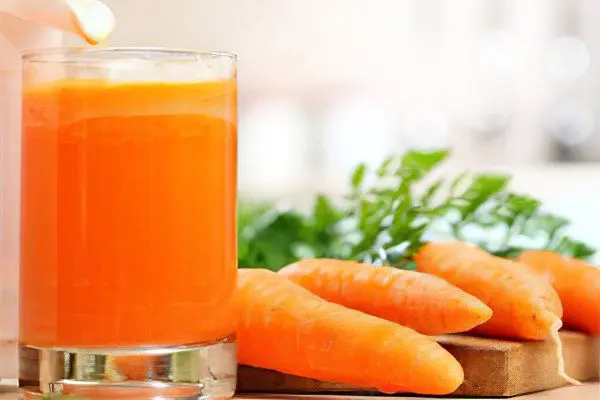 How much carrot juice can you drink a day?Carrot juice in juice therapy is recommended to take a glass a day. A glass contains approximately 250 ml of juice, which contains the daily requirement of vitamin A, covering the needs of both children and adults, including pregnant and lactating mothers. But many healers claim that even in the amount of 3 liters per day, carrot juice is safe, but you need to get used to it gradually and take into account all possible contraindications. For preventive intake, 250 ml of carrot juice or juice mixture per day is enough. In the treatment of specific diseases, the dosages change – for gastritis with high acidity, they start with lower dosages or drink juice in a large dilution, while cleansing the liver, you can take two glasses of juice a day. Carotene is processed by the liver, therefore, with an excess of it entering the body with carrot juice, its function may be impaired. |
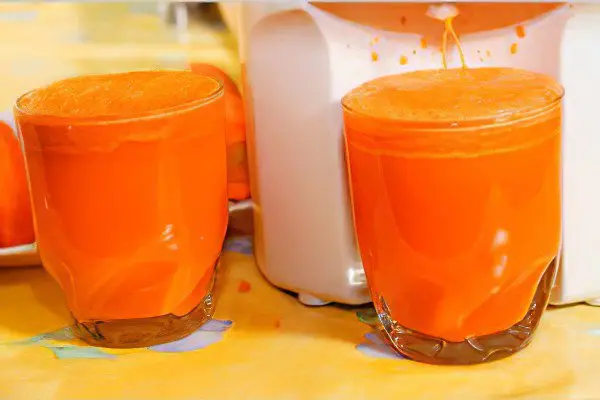 How long can freshly squeezed carrot juice be stored?Freshly squeezed carrot juice is best consumed immediately after preparation, because when stored for more than five minutes from exposure to air and light, the beneficial substances in it begin to break down, and the nutritional value of the product is significantly reduced. If you prepare juice in a screw juicer, then its shelf life in a closed container increases to several hours. |
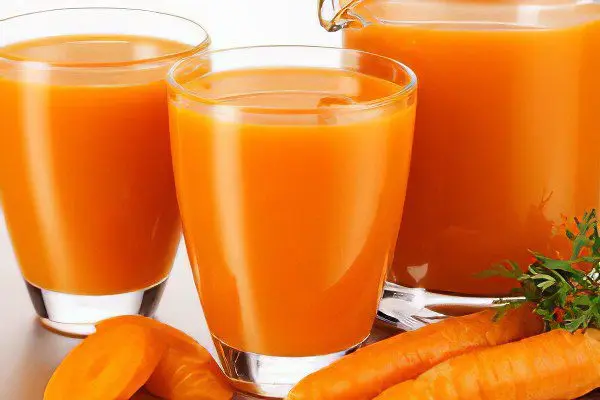 How often can you drink carrot juice? Can you drink it every day?Daily intake of carrot juice in the amount of one glass is safe for the body and can be practiced as a prevention of infectious diseases and beriberi in the autumn-winter period. For medicinal purposes, as well as to cleanse the body, carrot juice is used daily from three weeks to several months, while the dosage is gradually increased, bringing it up to two liters per day. |
 Is it possible to drink carrot juice during pregnancy?Carrot juice can be drunk by a future mother at any stage of pregnancy, this product is especially relevant in the last stages, since carrot phytoncides and its general strengthening effect help to avoid sepsis in a child after childbirth. |
 From how many months can you give carrot juice?You can give carrot juice to babies from the age of six months, if before that during the feeding process there were no allergic reactions when carrots were consumed by a nursing mother. The dosage for the first time is half or a whole teaspoon of undiluted juice at a time. |
 How much carrot juice can you give a child?In Soviet manuals for the care of newborns, carrot juice was part of complementary foods from the age of three months, modern sources recommend introducing juice into the diet of an infant from 6 months. Naturally, the dosage is different from the adult – juice is given in an amount of 50 to 100 ml, not daily, but a couple of times a week. Carrot juice is diluted with water and the reaction of the child’s body is observed, gradually increasing the number of single doses. |
The benefits of carrot juice in some diseases
Carrot juice for the liver
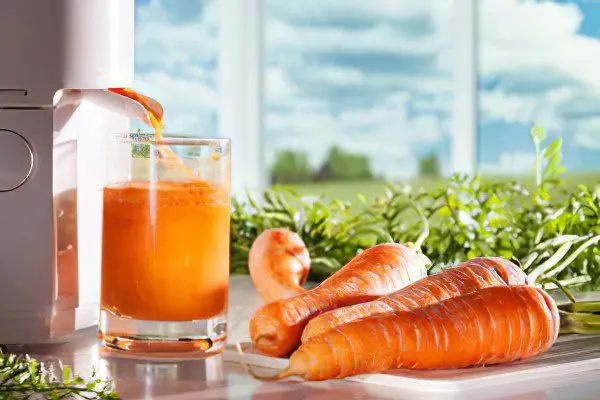
Raw vegetable juices are good for the liver primarily because they are easily and quickly absorbed without taking a lot of resources from the digestive system. The benefits of carrot juice in liver diseases are explained by the presence of natural sugars, vitamins, carotene in it, due to which this product accelerates the regeneration of the parenchyma, eliminates blockage of the liver duct and congestion, removes toxins and prevents its fatty degeneration. Vegetable juices are rich in potassium, while they contain a minimum of sodium, which allows you to even out the potassium-sodium balance of cells and improves the transport function of membranes. Sodium predominates in the diet of most people due to the habit of constantly eating salty foods.
Therefore, in order to cleanse the liver and restore its tissues, it is necessary to adhere to a salt-free regimen, and the carrot juice used as part of the cleansing course cannot be salted. Juice therapy takes an average of three weeks of daily intake of carrot and other vegetable juices, its period can be extended for chronic inflammation.
For the treatment of liver diseases, mixtures of carrot, beetroot and cucumber juice (proportion 10:3:3), spinach and carrot juice (6:10), carrot juice, dandelion greens and lettuce (9:3:4), carrots, stems celery and parsley (9:5:2) and pure carrot juice.
Carrot juice for gastritis
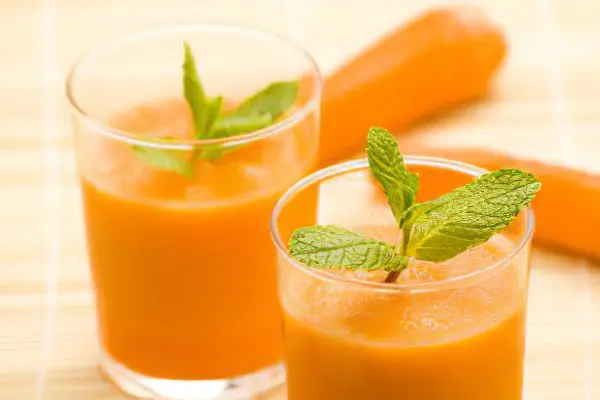
Opinions on the advisability of using carrot juice for gastritis differ. Some doctors recommend to refrain from this product, because it stimulates the activity of the secretory glands, while other experts, on the contrary, recommend it to normalize digestion with gastritis of high acidity. Carrot juice is strictly contraindicated at the stage of exacerbation of the disease, while in chronic gastritis it can be introduced into the diet in small doses of 100 ml per day.
Carrot juice not only normalizes the secretion of the digestive glands, but also improves the quality of the blood, since the vitamins and minerals present in it are involved in the processes of hematopoiesis, protect nerve cells, remove congestion in the liver, and help normalize stool with diarrhea and constipation.
Carrot juice for pancreatitis
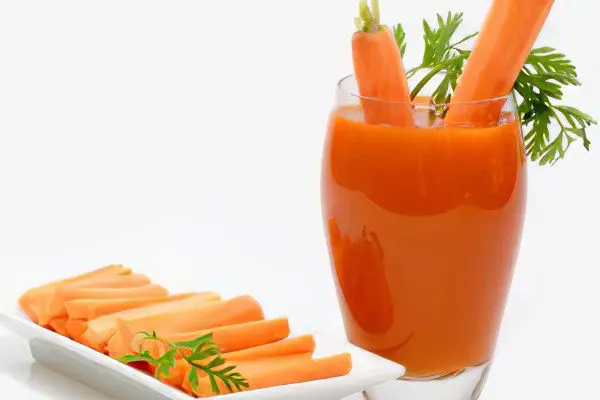
In the treatment of pancreatitis, carrot juice is included in the diet in small quantities, while it is rarely consumed in its pure form. This is due to its ability to enhance enzymatic activity – for a healthy person, this property is useful, as it stimulates digestive processes, but with a damaged pancreas, the load on the organ increases. Therefore, at the acute stage of the disease, carrot juice is not used.
Another reason for reducing the dosage of the daily intake of carrot juice in pancreatitis is the presence of sugary substances in it. The metabolism of sugars requires insulin produced by the cells of the pancreas, and if their function is impaired, an excess of sugars, if they cannot be absorbed, can create conditions for the development of diabetes mellitus.
For the treatment of chronic pancreatitis, juice mixtures of carrots and potatoes are used in a ratio of one to one, carrots and apple juice (1: 3), if no negative reaction to fruit juices has been found before. The proportion of carrot juice in the mixture can be gradually increased, but it should be consumed no more than 2-3 times a week.
Contraindications to the use of carrots
Carrot juice in large quantities is contraindicated in peptic ulcer and gastritis of high acidity at the stage of exacerbation of the disease. This product can increase the secretion of the digestive glands, which aggravates the patient’s condition.
In addition, carrot juice should be used with caution by diabetics. Boiled carrots have a high glycemic index, so diabetics should exclude them from the diet.










